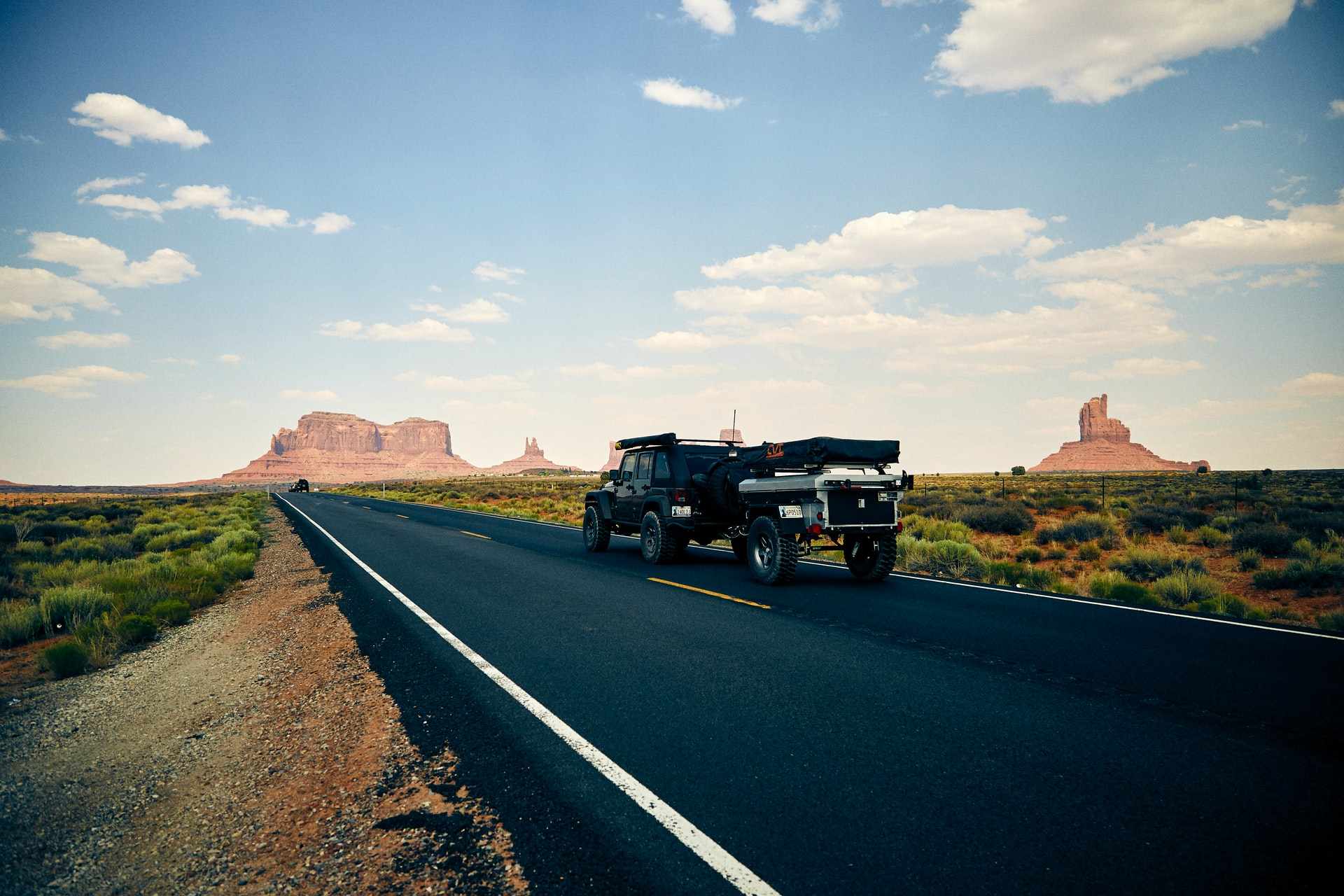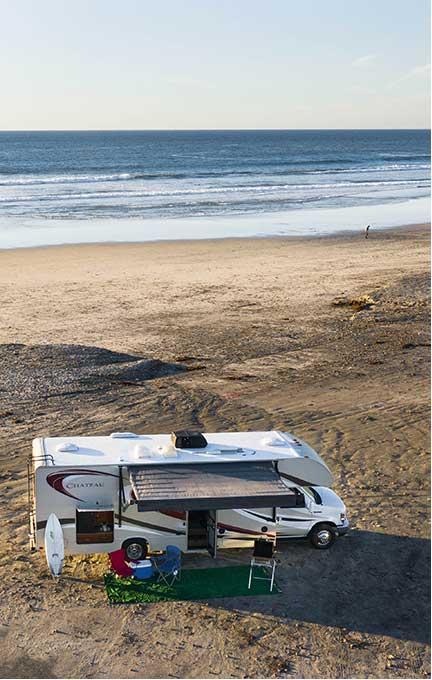Today, most RVs are equipped with many of the comforts of home like lights, appliances, televisions, and more. However, for these to work, your RV needs a steady supply of electricity. In an RV, electricity can come from several sources: batteries, solar panels, an electric hookup, and, of course, the faithful generator.
In this article, we’ll break down everything you need to know about RV generators, including the different types, what to consider when buying, and where to find the best quiet generator for an RV.
What is an RV generator?
We won’t get into all the mechanics here, but simply put, a generator is a machine that converts mechanical energy into electrical energy. For RVers, this device is able to power your rig wherever you go, even if you don’t have electric hookups available.
Types of RV generators
There are two types of generators that RVers use: built-in and portable.
Built-in generators are just that— built into your RV. They’re contained in their own specialized compartment and are wired directly into your RV. You’ll generally only find these on motorhomes, however, as built-in generators use fuel directly from the motorhome’s fuel tank. Some benefits of built-in generators are that they are easy to use and can provide more power than portable models. On the downside, they are pricier and more difficult to access and maintain.
Portable generators, on the other hand, are located outside of your RV and plug into from the exterior. They typically can’t supply as much power as an onboard generator and require you to fuel it separately. They’re less expensive and easier to maintain, but you must have the ability to lift and move the generator to where it’ll sit at your campsite.
Inverter generators (not to be confused with RV power inverters) are a type of portable generator. These models have more complex engines, so they are typically much more expensive. However, because of their advanced design, they tend to be much quieter than a traditional portable generator.
Things to consider when purchasing an RV generator
Aside from the type of generator you need, you’ll want to think about a few different factors when searching for the right machine.
- Size: You’ll want to think about size. Built-in generators need to be able to fit in the generator compartment on your RV. Portable generators need to be small enough for you (and whoever you may be camping with) to safely manage.
- Fuel type: If you have a built-in generator, you’ll want to consider the fuel type, since most use fuel from your motorhome’s tank. If your motorhome takes diesel, you’ll want a diesel-powered generator. When buying a portable generator, you can be more flexible on your fuel type.
- Power needs: You’ll also want to consider how much power you need. You can do this by adding up the approximate starting wattage of everything that you want to power simultaneously in your RV. Make sure to add a bit to your calculation— around 20%— so that your generator isn’t constantly running at full power.
- Safety and other special features: Lastly, consider safety features, fuel tank size, and other features such as electric start.
Knowing what you want and need in each of these categories can help narrow down your search.
Best quiet generators for RVs
Not sure where to find a good super quiet RV generator? Start your search with these five highly-rated portable options.
1. Dewalt DXGNR4000

- Fuel type: Gasoline
- Wattage rating: 4000 watts
- Other features: Fuel shutoff, low-oil shutoff, 4 power outlets
- Note: Though this isn’t an ultra-quiet inverter generator, this model does rank among the quietest for normal generators.
2. Generac XT8000EFI

- Fuel type: Gasoline
- Wattage rating: 8000 watts
- Other features: Electric start, low-oil shutoff, 5 power outlets
- Note: Though this isn’t an ultra-quiet inverter generator, this model does rank among the quietest for normal generators.
3. Honda EU7000is (Inverter generator)

- Fuel type: Gasoline
- Wattage rating: 5500 watts
- Other features: Electric start, low-oil shutoff, 4 power outlets
4. Honda EU3000is (Inverter generator)

- Fuel type: Gasoline
- Wattage rating: 2800 watts
- Other features: Electric start, fuel shutoff, low-oil shutoff, 3 power outlets
5. Honda EU2200iTAG (Inverter generator)

- Fuel type: Gasoline
- Wattage rating: 1800 watts
- Other features: fuel shutoff, low-oil shutoff, 2 power outlets
- Notes: This small, quiet RV generator is good for powering a few small appliances and electronics.
Generator use and maintenance tips
Generators, like most engines, require routine upkeep and maintenance to keep them running properly. To keep your genny running and the power flowing, you’ll want to do the following:
1. Start your generator every few months.
If you aren’t using your generator frequently, you’ll want to be sure to take time to run it every other month or so, especially if you have an electric starter. Doing so will
2. Use fuel stabilizer or change your fuel periodically.
Stale fuel is the #1 enemy of generators. Fuel stabilizer can increase the shelf-life of your gasoline, or you can simply opt to drain the fuel tank if you aren’t going to use it.
3. Always keep extra oil on hand.
Powering a large RV can be hard on your generator, which means you’ll need to change the oil more frequently. Be sure to always keep extra oil on hand and change it per the manufacturer’s guidelines.
4. Replace or clean the air filter regularly.
A dirty and clogged air filter can reduce the efficiency of your generator or cause it to quit working altogether. Check this regularly and clean or replace it as necessary.
Doing these four things alone can help prevent some of the biggest woes for generator users.
Common generator problems
If, despite your maintenance efforts, your generator is having problems starting or staying running, troubleshoot the issue by looking into the following common generator problems. Note that some problems have several potential fixes.
| Problem | Potential solution |
| Failure to start or rough operation (Fuel problems) | If gas is old, drain and add new fuel. If draining old gas and adding new gas does not solve the issue, you may have a dirty or clogged fuel line. These are inexpensive and fairly easy to replace. If this does not solve the issue, you may have a clogged engine or fuel pump, which requires more expertise to clean. |
| Failure to start (Dirty spark plugs) | Check the generator spark plugs. If they are dirty with sludge and dark carbon accumulations, it may be time to replace them. |
| Failure to start (Oil problems) | Low oil levels can cause a generator to not start. If adding oil does not solve the issue and the low oil indicator is still on, your sensor may be faulty. |
| Starts, but sputters and stalls | Check your air filters. If dirty, clean/replace. |
| Generator runs, but produces no power. | If your generator hasn’t been used for a long period, ran without a load for too long, or was connected to a load when it shut off, it may have lost residual magnetism. Follow your manufacturer’s instructions for restoring magnetism. This is usually done by plugging in a battery or using a drill. |
If your RV is still on the fritz despite your best troubleshooting efforts, it might be time to take your generator into a shop or call a mobile RV repair service out to you.
Keep the fun running with a quiet RV generator
Your RV generator can power everything you need to keep the fun going on your RV. If you’re an RV owner, including a generator or having the option to add one on can be great for renters looking to explore areas without shore power. It’s just another way to boost your listing and get people excited about exploring the great outdoors in your RV!








